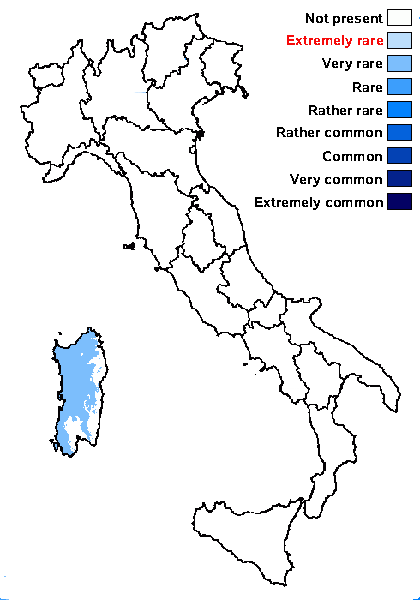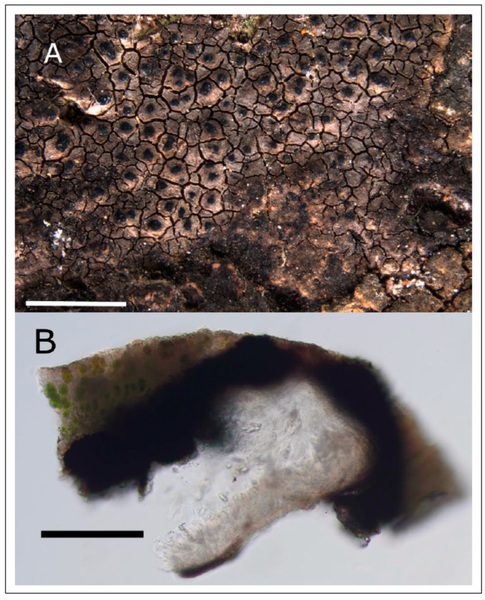Verrucaria mediterranea Thüs & Nascimbene
in Nascimbene & al., J. Fungi, 9, 380: 18, 2023
Synonyms:
Distribution: C - Sar (Thüs & Nascimbene 2023).
Description: Thallus crustose, episubstratic, pale brown to pale grey, c. 0.15 mm thick, rimose to areolate, the areoles c. 0.3 mm wide, not gelatinous when wet. Pseudocortex with a brownish pigment; medulla at least in some spots with a black basal layer, otherwise hardly distinguishable. Perithecia black, ⅔ to fully immersed in the thallus, with a distinct involucrellum reaching down to the basis of the perithecium, attached to exciple but thickened at base, forming a conical structure; exciple dark brown throughout; hamathecium of up to 50 μm long and 1.5-1.8 μm thick periphyses, interascal filaments absent. Asci 8-spored, clavate, I-, fissitunicate, the wall thickened above, with an ocular chamber, dehiscent by extrusion of an endotunica to form a delicate rostrum, Verrucaria-type, c. 64 × 19 μm. Ascospores 1-celled, hyaline, narrowly ellipsoid, 15-21 x 6-8.4 μm, 1.9-3.3 times as long as wide. Photobiont chlorococcoid, the cells mostly globose and 8-10 μm across, but some interspersed cells elongate and up to 20 x 10 μm. Spot tests: K-, C-, KC-, P-, UV-. Chemistry: without lichen substances.Note: a recently-described species growing on siliceous rocks in the splash zone of Mediterranean streams, hitherto known only from Sardinia.
Growth form: Crustose
Substrata: rocks
Photobiont: green algae other than Trentepohlia
Reproductive strategy: mainly sexual
Periodically submerged (e.g. in creeks)
Commonnes-rarity: (info)
Alpine belt: absent
Subalpine belt: absent
Oromediterranean belt: absent
Montane belt: very rare
Submediterranean belt: absent
Padanian area: absent
Humid submediterranean belt: very rare
Humid mediterranean belt: very rare
Dry mediterranean belt: absent

Predictive model
Growth form: Crustose
Substrata: rocks
Photobiont: green algae other than Trentepohlia
Reproductive strategy: mainly sexual
Periodically submerged (e.g. in creeks)
Commonnes-rarity: (info)
Alpine belt: absent
Subalpine belt: absent
Oromediterranean belt: absent
Montane belt: very rare
Submediterranean belt: absent
Padanian area: absent
Humid submediterranean belt: very rare
Humid mediterranean belt: very rare
Dry mediterranean belt: absent

Predictive model



